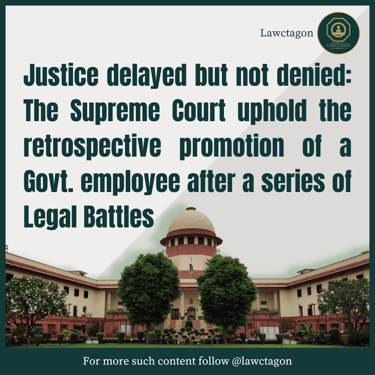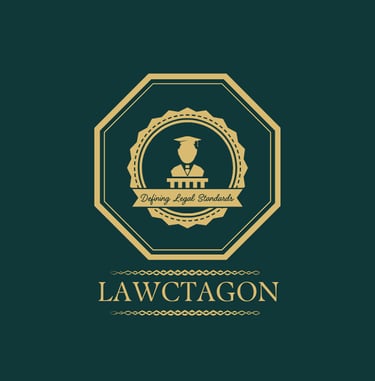Justice Delayed but Not Denied: The Supreme Court Upholds Retrospective Promotion of a Govt. employee after a series of Legal Battles [Bihar State Electricity Board vs. Dharamdeo Das]
LEGAL NEWS
7/23/20243 min read


Justice Delayed but Not Denied: The Supreme Court Upholds Retrospective Promotion of a Govt. employee after a series of Legal Battles [Bihar State Electricity Board vs. Dharamdeo Das]
Introduction
The Supreme Court of India recently delivered a significant verdict in the case of Bihar State Electricity Board vs. Dharamdeo Das. This judgement sheds light on crucial aspects of employment law, particularly concerning retrospective promotions and the rights of physically challenged and reserved category employees. The court's decision emphasizes the principles of fair treatment and adherence to established guidelines for promotions. This blog breaks down the case into its fundamental sections: facts, issues, court decisions, and the broader implications of the ruling.
Facts of the Case
1. Initial Employment and Promotions:
Dharamdeo Das, the respondent, is a physically challenged individual belonging to the Scheduled Caste category. He was appointed as a Lower Division Assistant in the Bihar State Electricity Board (the Board) on June 1, 1976.
Over the years, he received several promotions, eventually reaching the position of Joint Secretary on March 5, 2003.
2. Promotion Dispute:
Das contended that his promotion to Joint Secretary should be backdated to July 29, 1997, the date when the position became vacant, and he had completed the required qualifying service period (Kal Awadhi) for promotion.
The Board, however, argued that due to administrative reorganizations and existing appointments, it was not feasible to promote Das from the earlier date.
3. Litigation History:
The dispute led to a series of legal battles. Initially, the High Court of Patna's Single Judge ruled against Das. However, the Division Bench overturned this decision, directing the Board to promote Das retrospectively from July 29, 1997.
The Board then appealed to the Supreme Court, challenging the High Court’s directive.
Issues
The primary legal questions in this case were:
1. Entitlement to Retrospective Promotion:
Whether Dharamdeo Das was entitled to a retrospective promotion from July 29, 1997, despite the administrative challenges cited by the Board.
2. Interpretation of Kal Awadhi:
The correct interpretation of the Kal Awadhi (qualifying service period) and its binding nature on the Board’s decision to promote.
Court's Decision
1. Right to Consideration for Promotion:
The Supreme Court reiterated that while there is no fundamental right to promotion, there is a fundamental right to be considered for promotion. The court emphasized that eligible employees should be considered for promotion as per the established criteria and timelines.
2. Kal Awadhi Interpretation:
The Court noted that the Kal Awadhi represents the minimum period required before an employee can be considered for promotion. However, this does not automatically guarantee promotion but mandates that the employee should be evaluated for promotion once the period is completed.
3. Judgement on Retrospective Promotion:
- The Supreme Court upheld the High Court’s decision, affirming that Das should be granted promotion retrospectively from July 29, 1997. The Court recognized that administrative reorganizations should not undermine the rights of eligible employees, especially when they have completed the necessary qualifying service period.
4. Compensation and Benefits:
The Board was directed to provide Das with all the consequential benefits that would have accrued to him from the backdated promotion, including arrears of salary and other emoluments.
Analysis and Implications
1. Impact on Employment Law:
- This judgement reinforces the principle that organizations must adhere to their own rules and timelines regarding promotions. Administrative delays or reorganizations cannot justify the denial of rightful promotions to eligible employees.
2. Rights of Reserved Category Employees:
- The ruling highlights the importance of protecting the rights of physically challenged and reserved category employees. It ensures that these employees are not disadvantaged due to systemic inefficiencies or bureaucratic hurdles.
3. Organizational Accountability:
- The case sets a precedent for greater accountability among public sector organizations. It underscores that employees’ rights to fair treatment and timely promotion must be respected, and any deviations must be justified with valid reasons.
Conclusion
The Supreme Court’s decision in Bihar State Electricity Board vs. Dharamdeo Das is a landmark ruling that underscores the importance of fair and timely consideration for promotions within public sector organizations. It ensures that employees, especially those from reserved categories, are not unjustly denied their rightful advancements due to administrative inefficiencies. This case serves as a reminder of the fundamental rights enshrined in employment law and the need for organizations to uphold these principles diligently.


